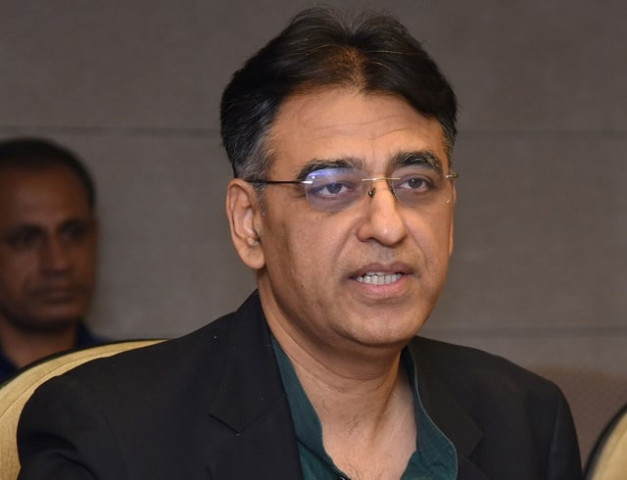Pakistan, IMF finalising elements of bailout memo
Asad Umar meets IMF’s new Mission Chief Ernesto Ramirez

Finance Minister Asad Umar. PHOTO:AFP
“The MEFP draft will be finalised at the end of the talks and Pakistan is exchanging both the qualitative and quantitative data with the IMF,” Finance Minister Asad Umar on Tuesday The Express Tribune after meeting with the IMF’s new Mission Chief Ernesto Ramirez.
The MEFP is the core of any IMF programme that describes commitments and objectives of the bailout package. It was the first visit of the new IMF mission chief to Pakistan.
“The new mission chief is visiting Pakistan for courtesy and introductory meetings with the Pakistani authorities,” said the IMF’s Resident Representative Teresa Daban Sanchez in a brief response.
Pakistan’s financing needs may hit $50b in next 2 years
The meeting between Umar and Ramirez continued for nearly two hours, which the Finance Minister described as ‘very productive’. Pakistan and the IMF have been locked into months’ long negotiations for the bailout package. The IMF’s staff level visit ended inconclusively in November last year when the talks broke down because of differences on almost every critical area.
However, Asad Umar said on Monday in presence of Prime Minister Imran Khan that IMF has changed its position and the agreement could be signed very soon. Pakistan is seeking 22nd loan programme of its history to meet its international debt obligations and put the country back on economic stability path.
Umar said he discussed the issues of interest rates and exchange rates with the new IMF mission chief and explained to him Pakistan’s position. Earlier, the IMF had asked Pakistan to introduce free-float exchange rate regime and an increase in interest rates to double digits to contain inflation.
World Bank advises Pakistan to set currency free of state control
Dr Najeeb Khaqan, adviser to Finance Ministry, tweeted on Tuesday and said no exchange rate target has been discussed and the IMF also does not envisage a target on the rupee-dollar parity.
The rupee has remained under pressure and further shed its value in last one week. On Tuesday, the rupee-dollar parity stood at Rs140.30 to a dollar. The finance minister said the fiscal deficit, budget and matters related to electricity and gas prices also came under discussion.
Earlier reports suggested that the IMF wanted further hike in electricity and gas prices aimed at ending the circular debt in the energy sector. The total power sector circular debt is close to Rs1.6 trillion that the IMF wants to get paid within couple of years.
There were also discussions on structural reforms and state-owned enterprises between Umar and Ramirez. The finance minister said the topics of the State Bank of Pakistan’s autonomy and Public Finance Management were also discussed.
He said the new IMF mission chief appreciated and liked Pakistan’s efforts to implement reforms. “We also have more or less an agreement on areas where future work has to be done,” he said.
Umar said he would hold a video conference with the IMF next week in which Pakistan’s position on points raised by the IMF will be discussed. This session has to be held before his departure to Washington for attending the Spring Meetings of the World Bank and the IMF next month, he said.
The Spring meetings will take place in Washington from April 12 to 14.
“We have been constantly exchanging our views topic by topic with the IMF,” he while responding to a question regarding Pakistan’s response to a proposed IMF macroeconomic framework that Fund shared with Pakistan last month.
The Finance Ministry was also preparing a medium term macroeconomic framework that it wanted to make public in January but subsequently withheld. Umar said the government has finalised the medium term macroeconomic framework but without an agreement with the IMF numbers cannot be shared.
The IMF chief also met with PM’s Adviser on Institutional Reforms Dr Ishrat Husain and took a briefing on the status of power sector. “The long term structural reforms have to be embedded in the macroeconomic stability programme,” said Dr Husain while talking to The Express Tribune.
However, there have been opponents to the IMF programme due to past experience. During his visit to Pakistan, Malaysia’s Prime Minister Mahathir Mohamad also shared his country’s experience while dealing with the IMF and the WB.
“During 1997 East Asian crisis, we were getting advice from the World Bank and the IMF but when we studied the advice and came to know that if we follow them we would be worse off ,” PM Mohamad said in an interview to the state-run PTV. “The WB and the IMF wanted that Malaysia should devalue its currency but we decided against it,” he said.


















COMMENTS
Comments are moderated and generally will be posted if they are on-topic and not abusive.
For more information, please see our Comments FAQ